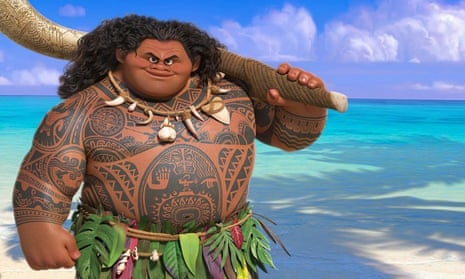The depiction of a Polynesian character in a Disney film has prompted anger across the Pacific islands, with one New Zealand MP saying the portrayal of the god Maui as obese was “not acceptable”.
Jenny Salesa, who is of Tongan heritage, shared a picture on her Facebook account which said Disney’s rendering of Maui in the film Moana resembled a creature that was “half pig, half hippo”.
“When we look at photos of Polynesian men & women from the last 100-200 years, most of our people were not overweight and this negative stereotype of Maui is just not acceptable - No thanks to Disney,” Salesa wrote.
This article includes content provided by Facebook. We ask for your permission before anything is loaded, as they may be using cookies and other technologies. To view this content, click 'Allow and continue'.
According to 2014 data from the World Health Organisation nine of the ten most obese nations in the world are Pacific Islands.
Samoan professional rugby player Eliota Fuimanono Sapolu also expressed his disgust at Disney’s portrayal of Maui, writing on Facebook that “Maui looking like after he fished up the Islands, he deep fried em and and ate em”.
In Polynesian mythology Maui is a heroic figure who created the Pacific Islands by fishing them out of the sea.
Will Ilolahia, from the Pacific Island Media Association, told Waatea News that Disney’s version of Maui did not fit with his heroic endeavours in Pacific creation myths.
“He is depicted in the stories that’s been handed down, especially in my culture, as a person of strength, a person of magnitude and a person of a godly nature,” Illolalia said.
“This depiction of Maui being obese is typical American stereotyping. Obesity is a new phenomena because of the first world food that’s been stuffed down our throat.”
However, many people have commented on social media that Disney’s Maui looks strong and powerful, and that his physique is not unusual among Polynesian men.
Isoa Kavakimotu, a Tongan New Zealand man who identifies with being “a pretty big guy” created a YouTube video on the controversy, saying he had no problem with Disney’s Maui.
“I am fine with it,” he said.
“He doesn’t look fat to me, he looks a like a powerhouse who could do extraordinary labours.
“He is big for that reason. In the film they are sailing on a traditional waka, it is set before colonisation, I highly doubt a take-away store will pop up in the film. To me, he looks ready for action.”
Samoan comic book artist Michael Mulipola posted a satirical breakdown of Maui’s body type on Facebook and Twitter, which highlighted how his physical attributes were indicative of character- and his character in the Disney film was as a comedic side-kick, not a hero.
“Here, I’ve broken down the shapes and body types and how they inform the personalities of the characters,” he wrote.
My lua sene on the Maui design for the Moana Disney film. Now you know and knowing is half the battle #WeAreMaui pic.twitter.com/T6T2ykGe57
— Michel Mulipola (@bloodysamoan) June 23, 2016
“I’m not phased by the way Maui is designed in this film. In Polynesian mythology, Maui is the demi-god who inspired many myths and legends. In this film, he would of done a lot of those amazing feats but he’ll be a blow hard braggart who can be a bit of an idiot.There’s a reason the upcoming film is called Moana and not Maui.”
Disney has been contacted for a response.
